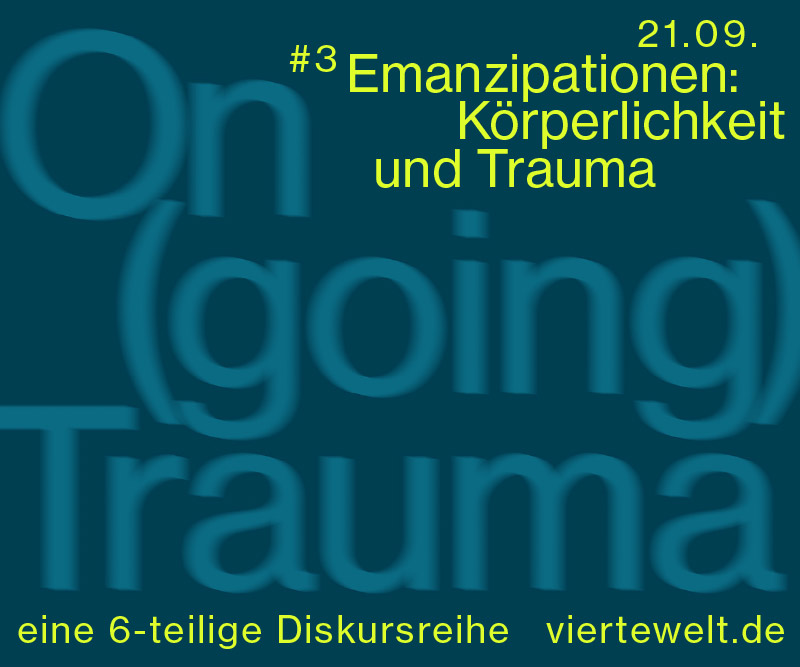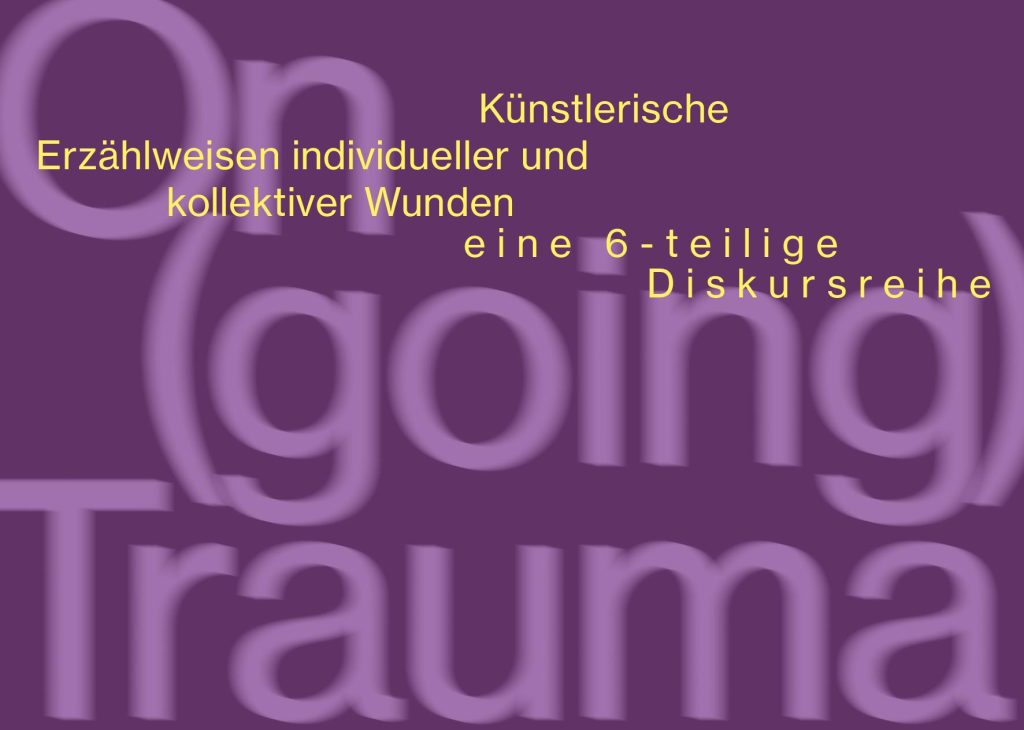
On(going) Trauma #3 – Emanzipationen und kollektive Resilienz: Körperlichkeit und Trauma
Anna-Lena Werner & Elisa Müller / Institut für Widerstand im Postfordismus
Sa. 21.09.24 | 15:00 – 19:30 Uhr
Eintritt frei, Anmeldung erbeten

Welche Art der Auseinandersetzung mit Gewalt können die Künste schaffen? Wie lassen sich Traumata erfahrbar machen, wenn Worte scheitern?
Die Reihe „On(going) Trauma“ öffnet gemeinsam mit Ko-Kurator*innen, Gäst*innen und den anwesenden Teilnehmer*innen einen Raum, um aus pluralen Perspektiven über künstlerische Forschungspraktiken im Umgang mit Trauma zu sprechen und von ihnen zu lernen. Wie ist ein Miteinander trotz unterschiedlicher Voraussetzungen, Betroffenheit und Involviertheit möglich? Vorgestellt werden diverse künstlerische und kuratorische Praktiken, in denen situiertes Wissen und Hintergründe systematischer Macht- und Gewaltstrukturen diskutiert, aktivistische und marginalisierte Perspektiven beleuchtet werden. In sechs Gesprächsrunden werden Diskurse aufgegriffen, die sich mit verschiedenen Schwerpunkten auseinandersetzen. Die Veranstaltungen sind als solidarische Netzwerktreffen, als offene Runden konzipiert, bei denen alle Teilnehmenden dazu eingeladen sind, mit zusprechen.
Weitere Informationen zur Gesamtreihe: LINK ZUR ÜBERBLICKSEITE
#3 Emanzipationen und kollektive Resilienz: Körperlichkeit und Trauma
Der Körper speichert Erfahrungen und Wissen – er ist eine physische Erinnerung sowohl an die viszerale Verletzlichkeit, als auch an mehr-als menschliche, kollektive Resilienz. Er wird instrumentalisiert, um hegemoniale Narrative, hierarchische Systeme und Gewalt gegen Gruppen fortzuführen.
Für die dritte Veranstaltung der diskursiven Reihe „On(going) Trauma“ in der Vierten Welt Berlin sind Künstler*innen und das anwesende Publikum eingeladen, Strategien zu vermitteln, zu teilen und sich durch ihre individuellen Praktiken mit den Verflechtungen von Körper, Erinnerungen und Traumata auseinanderzusetzen.
Methoden der Entkörperung und Desidentifikation, fiktionale oder ritualisierte Körperlichkeiten, sowie Anpassungen verschiedener (auch kollektiver) Persönlichkeiten werden kritisch als Möglichkeiten diskutiert, historische und politische Wahrheiten, Rechte und Narrative zurückzugewinnen.
Sprache: englisch, Übersetzung für Zuschauer*innen ins Deutsche bei Bedarf
Mit Isaac Chong Wai, İz Öztat, Natis tbc.
Moderiert und kuratiert von Anna-Lena Werner & Alper Turan
Photo: After, İz Öztat, 2016–ongoing
Marking tape, dimensions variable
Installation view from “Transit”, Zilberman Berlin
Courtesy of the artist and Zilberman
Die sechsteilige Kunst- und Diskursreihe On(going) Trauma ist initiiert vom Institut für Widerstand/Elisa Müller im Postfordismus und Anna-Lena Werner in Kooperation mit Vierte Welt in Berlin, gefördert durch Hauptstadtkulturfonds.
—————————————
On(going) Trauma
Initiated by Anna-Lena Werner & Elisa Müller / Institut für Widerstand im Postfordismus
more informationen on the complete series: LINK
#3 Emancipations and Collective Resilience: On the Body and Trauma
Storing experiences and knowledges, the body is a physical reminder of both visceral vulnerability and more-than-human (collective) resilience. It is being instrumentalized to continue hegemonic narratives, hierarchical systems and violence against groups.
For the third iteration of the discursive series “On(going) Trauma” at Vierte Welt Berlin, artists and the audience present are invited to share their strategies, engaging in the entanglements of the body, memory and trauma through their distinctive practices. Methods of dis-embodiment and dis-identification, fictional or ritualized bodies, as well as adaptions of different personas and collectivized selves will be critically discussed as possibilities to reclaim historical and political truths, rights and narratives.
With Isaac Chong Wai, İz Öztat, Natis tbc.
Hosted and curated by Anna-Lena Werner & Alper Turan
foto: After, İz Öztat, 2016–ongoing
Marking tape, dimensions variable
Installation view from “Transit”, Zilberman Berlin
Courtesy of the artist and Zilberman


